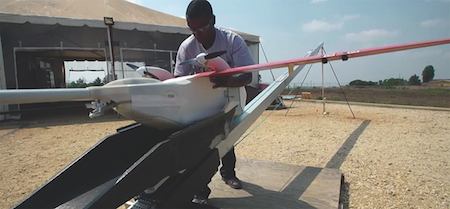Beginning in the first quarter of 2018, the Tanzanian government will begin using drones to make up to 2,000 life-saving deliveries per day to over one thousand health facilities, serving 10 million people across the country.
Drone Delivery Service
“Every life is precious. Tanzania is committed to making sure that each and every one of our citizens has access to the care they need when they need it,” said Dr. Mpoki Ulisubisya, Permanent Secretary of the Tanzania Ministry of Health, Community Development, Gender, Elderly, and Children. “Working with Zipline will help make that vision a reality.”
“We strive to ensure that all health facilities have the medicines and supplies they need, wherever they are,” said Laurean Bwanakunu, Director General of Tanzania’s Medical Stores Department. “But that mission can be a challenge during emergencies, times of unexpected demand, bad weather, or for small but critical orders. Using drones for just-in-time deliveries will allow us to provide health facilities with complete access to vital medical products no matter the circumstance.”
The drones and delivery service are built and operated by Zipline, a California-based automated logistics company. In October of 2016, Zipline and the Government of Rwanda launched the world’s first national drone delivery service to make on-demand emergency blood deliveries to transfusion clinics across the country. Since the October launch, Zipline has flown more than 100,000 km, over 1,400 flights to deliver 2,600 units of blood.
The Global Problem
Throughout both the developed and developing world, access to life-saving and critical health products is hampered by what is known as the last-mile problem: the inability to deliver needed medicine from a city to rural or remote locations due to lack of adequate transportation, communication or supply chain infrastructure. The result is that all too often someone in need of lifesaving care does not receive the medicine they need to survive.
The Solution
Countries across east Africa are leading the world in developing cutting edge solutions to the last-mile problem by pioneering on-demand drone delivery of life-saving medicine. Rwanda launched the world’s first national drone delivery operation in October of 2016. And today, Tanzania is announcing it will launch the world’s largest national drone delivery network.
“Millions of people across the world die each year because they can’t get the medicine they need when they need it,” said Zipline CEO Keller Rinaudo. “It’s a problem in both developed and developing countries. But it’s a problem we can help solve with on-demand drone delivery. And African nations are showing the world how it’s done.”
Tanzania will make on-demand drone delivery of blood transfusion supplies, emergency vaccines, HIV medications, antimalarials and critical medical supplies like sutures and IV tubes. Working in conjunction with the Tanzanian Ministry of Health and the country’s Medical Stores Department (MSD), Zipline will establish four distribution centers across the country.
The first distribution center, located in Dodoma, the country’s capital, will begin its first flights in the first quarter of 2018. Three additional distribution centers—two in the northwestern corner of Tanzania near Mwanza and Lake Victoria, and one in the Southern Highlands near Mbeya—will follow, working in close collaboration with civil and military aviation authorities.
Each of the four distribution centers will be equipped with up to 30 drones and is capable of making up to 500 on-demand delivery flights a day. The drones can carry 1.5 kilos of cargo, cruising at 110 kilometers an hour, and have a round trip range of 160 kilometers. Health workers place delivery orders by text message and receive their package within 30 minutes on average. Zipine’s drones take off and land at the distribution center only, requiring no additional infrastructure at the clinics it serves. Deliveries happen from the sky, with the drone descending close to the ground and air dropping the medicine to a designated spot near the health centers.
Leading global health researchers from the Ifakara Health Institute and the University of Glasgow will evaluate the impact of Tanzania’s drone delivery service on the clinics it will serve in Dodoma. The research will be supported by the Human Development Impact Fund and Saving Lives at Birth, an initiative led by the US Agency for International Development.
Zipline’s commercial partnerships with Rwanda and Tanzania are expected to save thousands of lives over the next several years. Zipline is hard at work catching up to demand to expand drone delivery services to countries across the world throughout 2018.


.jpg)
.jpg)
.jpg)

.jpg)



.jpg)
